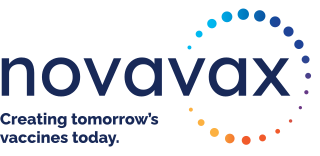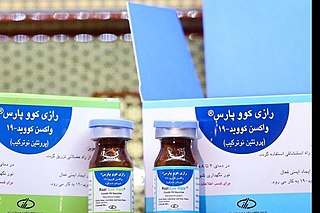
Moderna, Inc. is a pharmaceutical and biotechnology company based in Cambridge, Massachusetts, that focuses on RNA therapeutics, primarily mRNA vaccines. These vaccines use a copy of a molecule called messenger RNA (mRNA) to carry instructions for proteins to produce an immune response. The company's name is derived from the terms "modified", "RNA", and "modern".

Novavax, Inc. is an American biotechnology company based in Gaithersburg, Maryland, that develops vaccines to counter serious infectious diseases. Prior to 2020, company scientists developed experimental vaccines for influenza and respiratory syncytial virus (RSV), as well as Ebola and other emerging infectious diseases. During 2020, the company redirected its efforts to focus on development and approval of its NVX-CoV2373 vaccine for COVID-19.

Kizzmekia "Kizzy" Shanta Corbett is an American viral immunologist. She is an Assistant Professor of Immunology and Infectious Diseases at Harvard T.H. Chan School of Public Health and the Shutzer Assistant Professor at the Harvard Radcliffe Institute since June 2021.
Jason S. McLellan is a structural biologist, professor in the Department of Molecular Biosciences and Robert A. Welch Chair in Chemistry at The University of Texas at Austin who specializes in understanding the structure and function of viral proteins, including those of coronaviruses. His research focuses on applying structural information to the rational design of vaccines and other therapies for viruses, including SARS-CoV-2, the novel coronavirus that causes COVID-19, and respiratory syncytial virus (RSV). McLellan and his team collaborated with researchers at the National Institute of Allergy and Infectious Diseases’ Vaccine Research Center to design a stabilized version of the SARS-CoV-2 spike protein, which biotechnology company Moderna used as the basis for the vaccine mRNA-1273, the first COVID-19 vaccine candidate to enter phase I clinical trials in the U.S. At least three other vaccines use this modified spike protein: those from Pfizer and BioNTech; Johnson & Johnson and Janssen Pharmaceuticals; and Novavax.

The Novavax COVID-19 vaccine, sold under the brand names Nuvaxovid and Covovax, among others, is a subunit COVID-19 vaccine developed by Novavax and the Coalition for Epidemic Preparedness Innovations (CEPI).

The Beta variant, (B.1.351), was a variant of SARS-CoV-2, the virus that causes COVID-19. One of several SARS-CoV-2 variants initially believed to be of particular importance, it was first detected in the Nelson Mandela Bay metropolitan area of the Eastern Cape province of South Africa in October 2020, which was reported by the country's health department on 18 December 2020. Phylogeographic analysis suggests this variant emerged in the Nelson Mandela Bay area in July or August 2020.

CoVLP was a COVID-19 vaccine developed by Medicago in Canada and GlaxoSmithKline (GSK). The product and Medicago, Inc. were owned by Mitsubishi who terminated the company and program in February 2023 due to high international market competition for COVID-19 vaccines.

EpiVacCorona is a peptide-based vaccine against COVID-19 developed by the Russian VECTOR Center of Virology. The lack of protective effectiveness of EpiVacCorona, which is still in use in Russia, has been reported in scientific literature and in the media. The vaccine consists of three chemically synthesized peptides that are conjugated to a large carrier protein. This protein is a fusion product of a viral nucleocapsid protein and a bacterial MBP protein. A phase III clinical trial to show whether or not the vaccine can protect people against COVID-19 was launched in November 2020 with more than three thousand participants. The conclusions and results of the trial have not been made public.

PTX-COVID19-B is a messenger RNA (mRNA)-based COVID-19 vaccine, a vaccine for the prevention of the COVID-19 disease caused by an infection of the SARS-CoV-2 coronavirus, created by Providence Therapeutics—a private Canadian drug company co-founded by Calgary, Alberta-based businessman Brad T. Sorenson and San Francisco–based Eric Marcusson in 2013. A team of eighteen working out of Sunnybrook Research Institute in Toronto, Ontario developed PTX-COVID19-B in less than four weeks, according to the Calgary Herald. Human trials with sixty volunteers began on January 26, 2021, in Toronto.

N VBI-2902 is a COVID-19 vaccine candidate developed by Variation Biotechnologies from the United States.

The Sanofi–GSK COVID-19 vaccine sold under the brand name VidPrevtyn Beta, is a COVID-19 vaccine developed by Sanofi Pasteur and GSK.

UB-612 is a COVID-19 vaccine candidate developed by United Biomedical Asia, and Vaxxinity, Inc. It is a peptide vaccine.

NDV-HXP-S is a COVID-19 vaccine candidate developed under the leadership of Peter Palese, Adolfo García-Sastre, and Florian Krammer at the Icahn School of Medicine at Mount Sinai.

Razi Cov Pars is a COVID-19 vaccine developed by the Iranian Razi Vaccine and Serum Research Institute Razi Cov Pars is a covid-19 vaccine based on recombinant protein, which is being produced by Razi Vaccine and Serum Research Institute, Iran. This vaccine is the first injectable-intranasal recombinant protein corona vaccine.It's the second Iranian COVID-19 vaccine reaching human trials and is currently in phase III of clinical research during which it's compared to the Sinopharm BIBP vaccine.
Michael Yeadon is a British anti-vaccine activist and retired pharmacologist who attracted media attention in 2020 and 2021 for making false or unfounded claims about the COVID-19 pandemic and the safety of COVID-19 vaccines. The Times has described him as "a hero of Covid conspiracy theorists" and "a key figure in the antivax movement". Until 2011, he served as the chief scientist and vice-president of the allergy and respiratory research division of the drug company Pfizer, and is the co-founder and former CEO of the biotechnology company Ziarco.

COVAX-19 is a recombinant protein-based COVID-19 vaccine developed by South Australian-based biotech company Vaxine, in collaboration with CinnaGen, a private company with operations in the Middle East. It is under clinical trial in collaboration with the Iranian company CinnaGen.

Spike (S) glycoprotein is the largest of the four major structural proteins found in coronaviruses. The spike protein assembles into trimers that form large structures, called spikes or peplomers, that project from the surface of the virion. The distinctive appearance of these spikes when visualized using negative stain transmission electron microscopy, "recalling the solar corona", gives the virus family its main name.

COVID-19 vaccine clinical research uses clinical research to establish the characteristics of COVID-19 vaccines. These characteristics include efficacy, effectiveness, and safety. As of November 2022, 40 vaccines are authorized by at least one national regulatory authority for public use:

202-CoV is a COVID-19 vaccine candidate developed by Shanghai Zerun Biotechnology Co., Ltd., Walvax Biotech. It is one of several candidates under development by Walvax.

A universal coronavirus vaccine, also known as a pan-coronavirus vaccine, is a theoretical coronavirus vaccine that would be effective against all coronavirus strains. A universal vaccine would provide protection against coronavirus strains that have caused disease in humans, such as SARS-CoV-2, while also providing protection against future coronavirus strains. Such a vaccine has been proposed to prevent or mitigate future coronavirus epidemics and pandemics.







